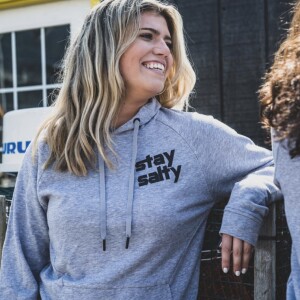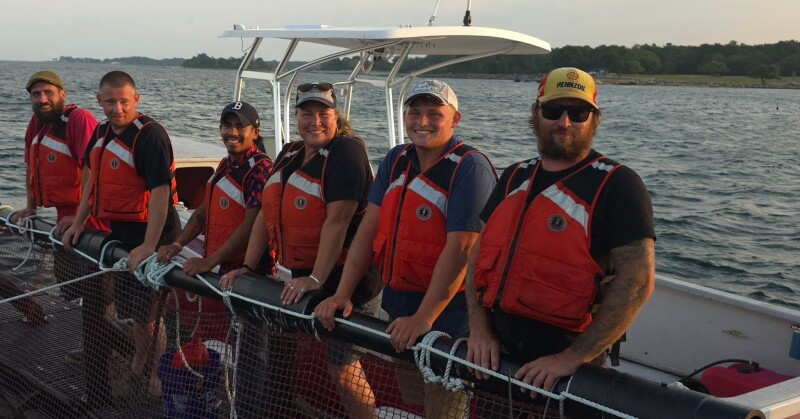For experienced commercial fishermen ready to elevate their careers, the New England Young Fishermen’s Alliance (NEYFA) offers an opportunity through its Deckhand to Captain (DTC) Training Program. This intensive nine-month course is designed to guide individuals from seasoned deckhands to successful owner-operators. I was able to sit in on a class and get a detailed look at what the program offers and some of the latest updates from the local fishing community.
NEYFA's DTC Training Program is open to commercial fishermen with at least three years of experience as a deckhand or sternman. The program equips trainees with essential skills in business management, loan acquisition, financing, public speaking, industry regulations, collaborative marketing, and branding, among other skills. The students benefit from one-on-one mentorship with their experienced captain mentor, class guest speakers, members of the fishing community, and guidance from the program's founder, Andrea Tomlinson. Tomlinson began working within the commercial fishing industry shortly after she graduated from the University of New Hampshire (UNH). On her first trip fishing in the Gulf of Maine, she was hooked on creating an impactful career within the industry. Her background spans years in aquaculture to groundfish and encouraging the coastal communities to support fishermen and buy local seafood.
“I knew I wanted to be a marine biologist and work with the sea since I was about ten years old, fishing for fluke and bluefish off the docks at Clarkes Landing marina in Point Pleasant, NJ, where our family kept our rec boat growing up. I have worked in wild-caught fisheries and, before that, in finfish and shellfish aquaculture for most of my career,” shared Tomlinson.
“When I started working directly with fishermen from NH on a cod aquaculture project at UNH, a few years out of college, I was hooked. I also enjoy promoting the consumption of fresh seafood caught or grown responsibly, benefiting our working waterfronts in New England. Working towards a healthy and long-lasting commercial fishing workforce in our small and medium-sized boat fishing industry in northern New England is essential right now. We must do this to ensure the success of our industry's future and prioritize U.S.-caught seafood on every American's dinner table.”
Her drive to start NEYFA was seeing firsthand how most of the industry was on the brink of retirement. The program was founded through years of work, beginning in 2019 with help from a grant from the United States Department of Agriculture (USDA). Finally, it came to fruition in 2022 when the program welcomed its inaugural class of students.
“It was so exciting taking applications in March 2022 for this program we had been envisioning for over three years! We graduated four trainees that year, two of whom have become owner-operators, and the other two are currently firming up their business plans,” shared Tomlinson. “We had six graduates last year who are currently doing the same, and our 2024 cohort is on fire! Two of our six current trainees are applying for loans for their vessels and permits.”
The DTC program also includes a free 2-day safety/survival and drill conductor course with NEYFA"s partner, Fishing Partnership Support Services (FPSS). It requires a commitment of 15 hours to collaborative research and/or advocacy. Trainees then submit a business plan and budget for their owner-operator business to their assigned 1:1 business advisor. Successful completion earns trainees a $5000 stipend and a $2000 stipend for their mentor. Classes are held bi-weekly in Portsmouth, New Hampshire, with USDA, National Sea Grant, and the Builders Initiative support.

I met the 2024 class of the DTC Training Program and got a taste of what was in store for the group. The six students will continue to gain hands-on advice in business planning, budget management, boat and permit procurement, and navigating insurance and licensing requirements; however, they come from different backgrounds on why they want to make fishing a lifelong career. Meet the students:
Ryan Sirois is a 32-year-old first-generation fisherman who fishes out of York, Maine. He met Tomlinson through a fishing safety program and was introduced to the DTC Training Program.
Oscar Foye is a fourth-generation fisherman who has been on the water for 14 years. Foye is 21 years old and learned about the program through Sirois, did some research, and applied.
Joe Archambault is a New Hampshire native who has worked with his family and other local fishermen for almost his entire life. The 36-year-old commercial fisherman has been in the gillnet, groundfish, and lobster industries.
Styon Papazou is 44 and has been based in Portsmouth for the past three years. He began his fishing career in Cape Cod with conch and black seabass. He then began tuna fishing and worked at an oyster farm. Papazou was introduced to the DTC program when he met Tomlinson at the Maine Fishermen’s Forum in Rockport, Maine.
Alex Varner is 22 and a four-year commercial lobsterman from Portsmouth who began fishing at 18.
Jeremy Elwell, 34, has been fishing primarily for lobster since he was nine out of New Castle, New Hampshire. He grew up watching his family fish. His grandfather owned a groundfish boat in the area, and that’s where his interest in fishing began.

At the DTC Training Program meeting, attendees gained valuable insights from a variety of experienced industry professionals:
- Richie White from the Port Authority Revolving Loan Fund spoke about the unique commercial fishing loan program. With 25 years of tuna fishing experience and a background in regulatory aspects with the NH Fish & Game Commission and the Atlantic States Marine Fisheries Commission (ASMFC), White detailed how the revolving loan fund can support new business owners with fixed-rate loans for vessels, permits, and more.
- Jake Eaton, a 2022 DTC graduate, shared his journey of securing his own boat and transitioning from a sternman to a boat owner, reflecting on his 14 years of fishing experience and showing the current class his final business plan from the program.
- Steve Newick of Newick ’s Lobster House emphasized the importance of resilience and adaptability in starting a business. With a background in the industry, Newick highlighted the value of diversifying operations and exploring additional opportunities beyond fishing.
- Liz Salas from the Regional Economic Development Corporation discussed her role as a business advisor and lender, offering advice on the business plan creation, projections, and securing additional funding post-program.
The meeting also addressed key questions and topics involving the importance of diversifying operations and engaging in different fisheries, which can stabilize and enhance business viability. White explained at the meeting, “Your business will be affected by things such as gauge increases, climate change, and further regulations in the Gulf of Maine, which all is happening quickly.” He touched on his experience and time spent in the ASMFC while emphasizing the importance of being prepared in their business plans.
The importance of advocacy and research was mentioned throughout the class. Tomlinson reminded the class to take advantage of opportunities to learn so that they can advocate for the fishing industry.
“Fishermen must be their own advocates for the future of their industry. We don't have unions, and small/medium-sized boat owners can't afford lobbyists. This industry is our country's 7th most regulated industry, and management protocols are complex and lengthy. Agency speak is in acronyms, which is hard to understand. Industry-based data and knowledge are not utilized efficiently or effectively when making fishing policy and management decisions. Luckily, there is an awakening happening within our regulatory bodies in New England, and that is starting to welcome industry-based knowledge and data collection when decisions are being made,” Tomlinson stated.
“Young fishermen and women must be at the table, participating in regulatory decisions. Whether attending a New England Fisheries Management Council meeting, an NH Fish and Game or Maine DMR meeting, a lobster management meeting, or a BOEM meeting about offshore wind and fishing- you have got to show up.”

Tomlinson and regulatory groups encourage young fishermen and women to join Advisory Panels (AP) on the New England Fishery Management Council or the ASMFC to represent their industry. Those regulatory bodies are also supportive of this. She shared, “As our veteran NH fisherman and advocate, Captain David Goethel, says, ‘If you are not at the table, you are on the plate.’”
Safety training is just as necessary as advocacy since each year, our commercial fishing industry takes turns with logging by ranking as the most dangerous industry in the nation, according to the U.S. Bureau of Labor Statistics.
“There are no safety requirements for a greenhorn deckhand or sternman getting on the boat for the first time or even for seasoned captains for that matter,” Tomlinson noted.
“Most fishermen don't wear PFDs, and you must know what to do in any number of emergency situations that could arise at sea. That's why we partner with the FPSS professional training team out of Gloucester, MA. At a minimum, we require our DTC trainees to take the two-day safety and survival/drill conductor training, which earns them a USCG/ASMEA certification. We also encourage the CPR/First Aid and Vessel Stability class that FPSS offers. Knowing the basics of safety and prevention procedures goes a long way toward saving lives.”

The DTC Training program is helping shape the New England fishing industry by setting these individuals up as future leaders within their communities. It has helped the younger generation of the current and past classes enter the fishing industry as owner-operators who understand what it takes to stay afloat in an ever-changing industry.
By participating in NEYFA’s DTC Training Program, these individuals will gain the expertise to run a successful business and contribute to a sustainable future for commercial fisheries. If you want to apply to the Deckhand to Captain Training Program or learn more, contact Andrea Tomlinson at andrea@neyoungfishermen.org or 603-767-7209. The program invites applicants from southern Maine, northern Massachusetts, and New Hampshire. Applications for 2025 will be available on their website in mid-February. You can find them at neyoungfishermen.org and on Facebook and Instagram.







